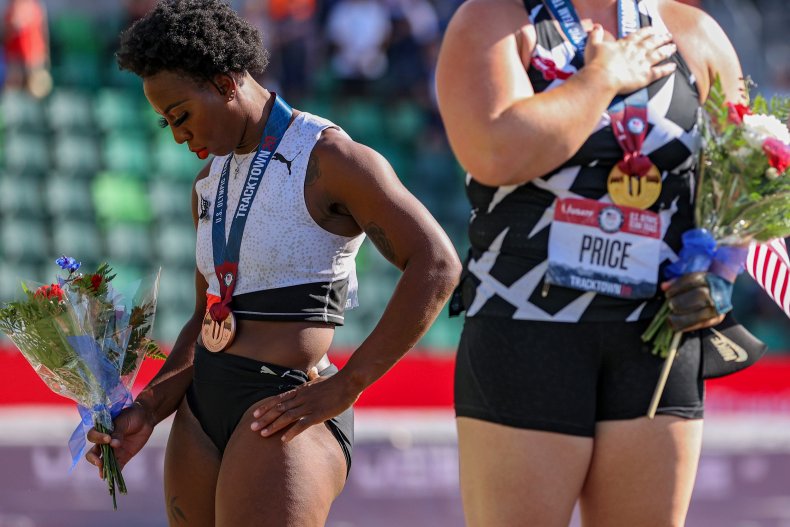Majority of Black People Want Athletes To Respect U.S. Flag
A majority of Black people want Olympic athletes to "respect" the U.S. flag, according to a new poll.
In June, hammer thrower Gwen Berry made headlines when she turned away from the flag while the national anthem played as she stood on the podium after securing her spot at the Tokyo Olympics.
Berry later said her mission was to use her position to raise awareness of social injustices in the U.S.
"The anthem doesn't speak for me. It never has," she said. "I'm here to represent those ...who died due to systemic racism."
But the latest I&I/TIPP survey found the majority of Americans don't support such protests, and want athletes to show respect for the U.S. flag during international competitions.

The poll found that 79 percent of the public believe it is important for professional athletes "to publicly respect the American flag on the international level." Sixty percent of respondents said it was "very important."
Just 8 percent of those surveyed said it was "not very important" and another 8 percent said it was "not at all important."
Majorities in almost every demographic agreed, including almost two-thirds (61 percent) of Black people.
The results by party breakdown were similar, with 93 percent of Republicans believe showing respect for the flag was important compared to 72 percent of Democrats.
The survey was conducted between June 30 and July 2 and included responses from 1,424 adults.
Berry's recent protest came almost two years after she was put on probation after raising her fist on the podium after winning gold at the Pan-Am Games in 2019.
Late in 2020, the U.S. Olympic and Paralympic Committee announced it would not sanction athletes who raise their fists or kneel in protest at the U.S. Olympic & Paralympic Trials, after renewed scrutiny following summer 2020's widespread protests against racial injustice.
The USOPC's new Council on Racial and Social Justice answered calls from athletes not to enforce the Olympic Charter's controversial Rule 50, which famously led to U.S. sprinters Tommie Smith and John Carlos being sent home from the 1968 Olympic Games in Mexico City.
However, the International Olympic Committee said in April that it would keep the rule, which states that "no kind of demonstration or political, religious or racial propaganda is permitted in any Olympic sites, venues or other areas."
The IOC has said that violations will be evaluated by the athlete's respective National Olympic Committee, International Federation and the IOC, and disciplinary action will be taken on a case-by-case basis as necessary.

